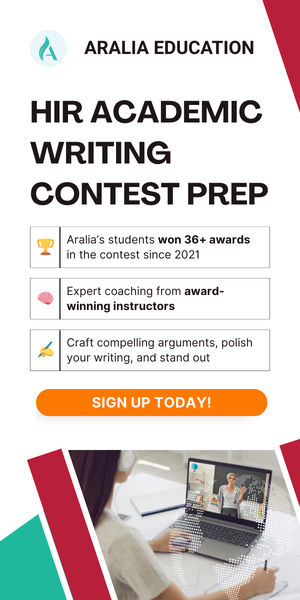85% of Aralia Students Place in Top Writing Competitions
1. Start Your Research Process
Before writing an English or History research paper, pick a research topic that draws your attention at first glance. If you’re interested in the political side of history, you could research nuclear warfare and related military conflicts or political strategies. A popular, new, non-fiction book in this field is Nuclear War: A Scenario by Annie Jacobsen, which utilizes statistics to vividly illustrate the catastrophic aftermath of a nuclear strike on Washington D.C., and other vital regions. Or, you may be interested in the sociological impacts of Vietnamese immigrants in America after the Vietnam War. You can reference renowned authors such as Ocean Vuong and his book On Earth We’re Briefly Gorgeous. Out of the endless suitable possibilities for a high school humanities research paper, we’ve compiled a list of historical research topics for you to choose from.
Begin your research process with broad, preliminary research on your research topic. Grasp a general understanding of this topic and identify an area to focus on. For example, you may start with researching George Orwell’s influence on modern society as a legendary author, then continue to single out one of the many societal issues he critiques in his writings (i.e., the struggle of class immobility and the cyclical nature of oppressive regime changes) and pull quotes from a select couple of books (i.e., Animal Farm and Down and Out in Paris and London), comparing them to one contemporary cultural phenomenon or a significant recent historical event.

2. Write a Research Question and Thesis Statement
Next, write a concise research question to narrow down your topic by subject, time period, demographic, region, etc. Say your broad topic is political strategies in nuclear warfare. Your specific research question may be on the differences between nuclear warfare deterrence strategies used by the U.S. in the Cold War vs. present-day political strategies, questioning the efficacy of a political strategy based on mutually assured destruction. You can further specify your research scope and single out one crisis event from the 40+ years of the Cold War.
After you’ve clarified your research topic, conduct a second round of research concentrated on your research question. At this point, begin keeping track of your sources. Bookmark all relevant sources, keep a document of important quotes and evidence, notice central themes, and begin to draw links where one event led to the next or changed the course of events.
Finally, group these sources into 3-4 “buckets” based on similarity and look at the collective argument between your sources. With all your main points laid out in front of you, find the overarching theme, and write your thesis statement. Your thesis statement answers your research question and clearly states your argument for the causal relationship (and the significance of that relation) between two literary texts, historical events, etc.
3. Write Your Introduction
The Introduction follows the format of an attention-grabbing hook, research question, topic sentences for each of your body paragraphs, and your thesis statement in the research paper. We’ve provided examples of research questions and thesis statements, the core components of an introduction.
Research Question Examples:
On George Orwell’s depiction of class struggles
- How does George Orwell explore class struggles in his books Animal Farm and Down and Out in Paris and London, and what message does he convey about societal inequality?
- How are the themes of exploitation and oppression depicted through class struggles in these books?
- To what extent does Orwell’s personal experiences of poverty and his observations on hardship experienced by the lower class shape his portrayal of class conflict? Is it biased or insightful?
On Dorothea Lange’s photographic portrayal of Japanese American internment
- How does Dorothea Lange’s photograph Registering for Evacuation at San Francisco critique the injustice enacted upon Japanese Americans during World War II internment?
Thesis Statement Examples:
On Dorothea Lange’s photographic portrayal of Japanese American internment
- In contrast to cheerful, unsympathetic imagery showcased in mainstream media of the time period, LIFE Magazine and U.S. Camera, Dorothea Lange’s Registering for Evacuation at San Francisco for the publication Survey Graphic evokes heartfelt sympathy for the Japanese internees and urges viewers to question the government’s actions, all while presenting the Japanese community with dignity and rightful respect.
Topic: Japan’s Meiji Restoration
- This paper will argue that the Meiji Restoration successfully consolidated power to a single ruler (the emperor) and improved Japanese foreign affairs with Western countries, but failed to provide happy lives for Japanese citizens, who were essentially subjects to the emperor.
Topic: Shakespearian Misogyny in Hamlet
- This paper will discuss how, throughout Hamlet, Shakespeare uses Gertrude and Ophelia to subtly yet assuredly pressure women in his audience to be quiet, passive, and acquiescent and to silence their controversial opinions.
On character analysis of Haruki Murakami’s Kafka on the Shore and Gabriel Márquez’s One Hundred Years of Solitude
- With Remedios the Beauty and Miss Saeki’s notable congruency in shallow personalities and lifestyles, these female characters serve the same purpose in their worlds as relics of the past one can only long for but never revisit.
4. Write 3+ Body Paragraphs With 9+ Pieces of Evidence
- Where the caption and title fall short of the truth, a close examination of visual elements in the photograph reveal the reality of the hellish experience, while also hinting at Dorothea Lange’s personal opinion against Executive Order 9066.
- While Gertrude proves the hopelessness of disagreeing with her male superiors, Ophelia represents the futility of responding to insults from the male characters.
- While all male deaths in the play have a clear cause and reasonable context, female deaths (and motives) are shrouded in mystery. Shakespeare so devalues the deaths of Gertrude and Ophelia that he does not bother to emphasize the complexity of nor clarify the reasoning behind these female deaths.
- Miss Saeki from Kafka and Remedios the Beauty One Hundred Years of Solitude mirror each other not only in their most classic character traits, but also in the way they pass away and exit the storylines of their respective literary novels.
- Although both women were integral to the progression of the respective plotlines, their characters served largely just as emblems and reminders of the past of Macondo and of Miss Saeki herself.
- “The Treaty of Nanking (1842) not only ceded Hong Kong to Britain, but also opened five ports for foreign trade, effectively turning key Chinese cities into international economic hubs under foreign control.” —British Imperialism: 1688-2000 by P. J. Cain & A. G. Hopkins.
- “Foreign powers, especially the British, gained control over China’s railway system, which allowed them to facilitate the export of goods from China while maintaining significant economic influence over the country’s industrial development.” —The Opium Wars and China’s Response to Western Imperialism by David Kerr.
- “The British monopoly on the opium trade not only destabilized the Chinese economy, but also led to the widespread addiction of its people, draining both financial and human resources, which hindered China’s broader economic development.” —The Opium War: Drugs, Dreams, and the Making of Modern China by Julia Lovell.
| Undermined | Exploited | Facilitated | Subjugated | Imposed |
| Restricted | Transformed | Disrupted | Weakened | Deprived |
| Manipulated | Limited | Reshaped | Consolidated | Enforced |
| Domineered | Reinforced | Hindered | Diminished | Intensified |
Unlock Your Writing Potential: Students in Our Writing Competition Preparation Class Are More Likely to Secure Awards
Evidence and Analysis Examples:
On Shakespearian misogyny in Hamlet
- Main idea: Gertrude only expresses her own opinion—one that’s not in complete concordance with Claudius—once throughout the play, and her words sadly reinforce Shakespeare’s belief that women should not disagree with their male counterparts.
Evidence and analysis: “The lady doth protest too much, methinks” (3.2.254), which promotes the male ideal that women should not express judgment, especially not judgment that opposes the male-determined majority consensus.
- Main idea: Hamlet frequently acts inappropriately and speaks rudely to Ophelia, and Ophelia always takes it with a smile-and-nod attitude. Despite his extreme disrespect for her, Ophelia’s brief responses simply allow her to be further insulted.
Evidence and analysis: “You are keen” (3.2.272)… Hamlet retorts, “It would cost you a groaning to take off mine edge” (3.2.273-274),” emphasizing how Ophelia’s attempts to respond are twisted into further ridicule.
On character analysis of Haruki Murakami’s Kafka on the Shore and Gabriel Márquez’s One Hundred Years of Solitude
- Main idea: Due to their pitifully meaningless and broken fragments of a potentially fulfilling life, Remedios the Beauty and Miss Saeki both appear to have shallow personalities. A widespread stereotype acting against women is the social pressure to be a quiet, opinion-less trophy to show off the success of her husband. The more beautiful, absentminded, and well-mannered the trophy wife is, the more powerful, successful, and upper-class the husband then appears.
Evidence: “She was so beautiful that she seemed almost unreal, and she was completely oblivious to the havoc her beauty caused in the world” (Márquez 201). “Miss Saeki carried herself with a calm, poised dignity, every gesture refined, every word deliberate, as though she existed in a different time” (Murakami 180).
Analysis: Both Remedios the Beauty and Miss Saeki epitomize the qualities of being absentminded yet elegantly well-mannered, which suggests that García Márquez and Murakami use their fame and these characters to broadcast a social commentary denouncing such a societal construct.
5. Disprove Opposing Evidence in the Last Body Paragraph
As of now, your first three body paragraphs provide evidence supporting your thesis statement. For your fourth body paragraph, bring up evidence claiming the contrary and disprove that opposing evidence—this makes your argument more credible and persuasive and paints your entire research paper as well-researched. See below example:
Opposing Evidence:
While Hamlet has often been criticized for its portrayal of women, it can also be argued that Shakespeare imbues his female characters with subtle complexity and moments of agency that challenge simplistic readings of misogyny.
Disprove it:
While Gertrude’s act of drinking the poisoned wine may seem rebellious, it ultimately leads to her death, reinforcing the idea that women who disobey male authority will undoubtedly face punishment.

6. Conclusion
Do not start your conclusion with “In conclusion…” of “Finally…” Start with restating your thesis statement and a summary, or rephrase of all your topic sentences combined. End with a thought-provoking argument that expands the scope of your research topic. This does not mean start a new argument without evidence to back it up. The goal of hinting at expanding your research topic is to leave your reader questioning the greater implications of your research and thesis. This statement garners curiosity and encourages your reader to maintain interest in your topic and possibly conduct research of their own.
Example of how to start your conclusion:
From Gertrude stating that women should not “protest too much” (3.2.254) to both female characters dying simplistic, inconsequential deaths, Shakespeare uses women in Hamlet to urge and threaten women in his audiences to be quiet, passive, and acquiescent.
7. Bibliography
Humanities research papers for a high school English or History class will typically follow the MLA format for citations. Learn how to master citations and bibliographies for all your high school research papers.
8. Conduct Research With Aralia Education
Now that you’re ready to begin outlining your English or History research paper, collaborate with experienced teachers at Aralia Education and begin your research process! We offer research programs in International Relations, History, and AP Seminar. Work with teachers from the nation’s best private high schools through Aralia’s online classes.

Aralia offers various research classes spanning across multiple subjects within English and History:











